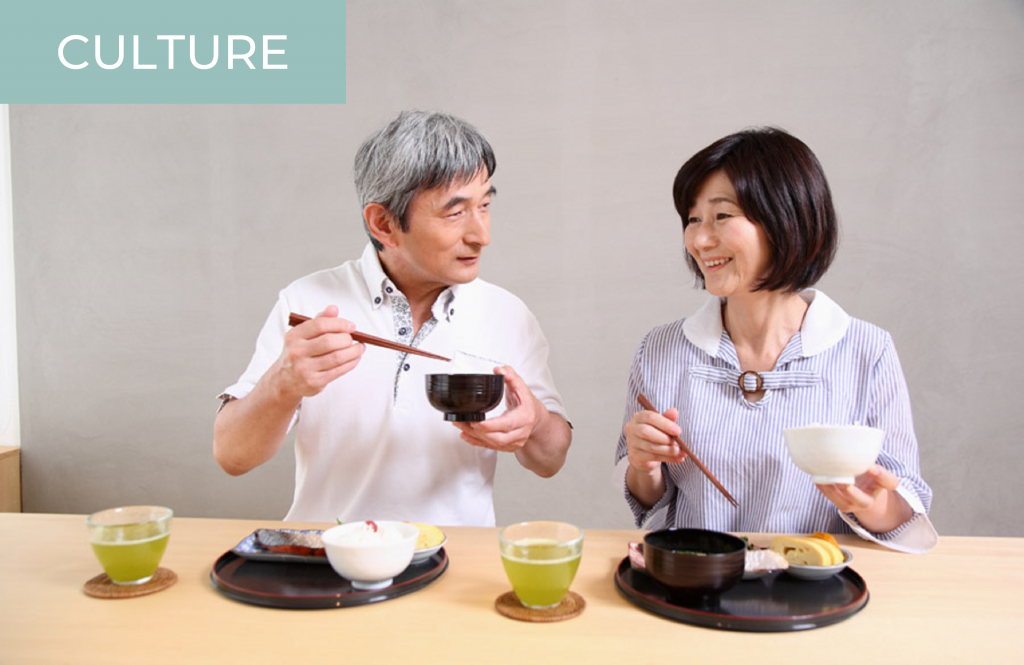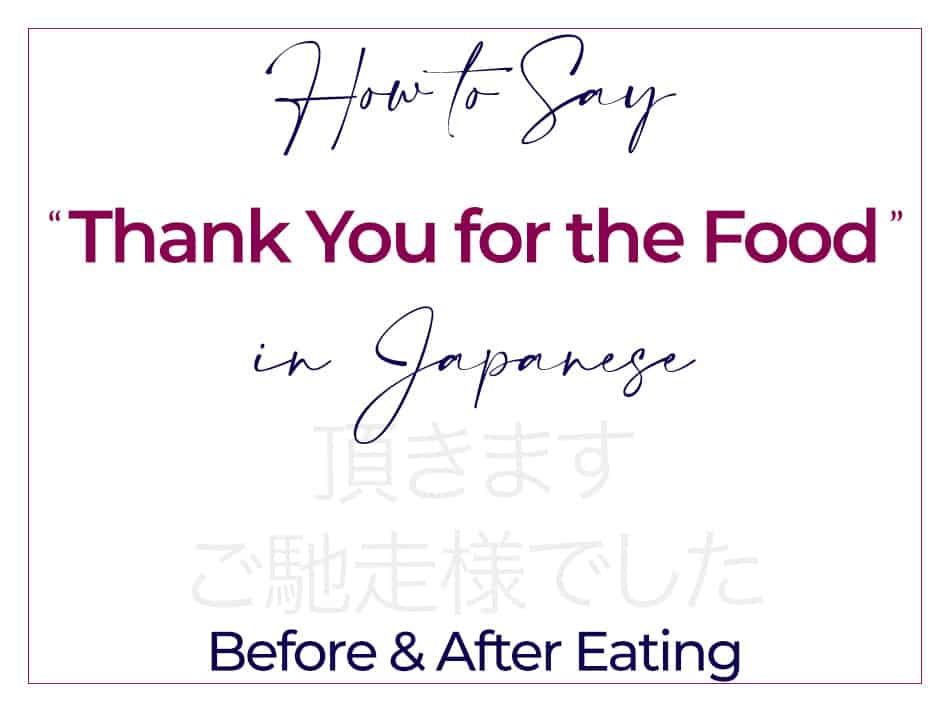You are looking for information, articles, knowledge about the topic nail salons open on sunday near me how do you say thanks for the food in japanese on Google, you do not find the information you need! Here are the best content compiled and compiled by the Chewathai27.com team, along with other related topics such as: how do you say thanks for the food in japanese thank you for the food japanese translation, thank you for the food in japanese naruto, thank you for the food” in japanese anime, how to say thank you in japanese, thank you very much in japanese, what do you say before eating in japanese, how to say thank you for the food in korean, thank you for the food in chinese
Contents
How do you say thank you for a meal in Japanese?
Before eating, you say, Itadakimasu” (いただきます), which means Let’s eat or Bon Appétit, and at the conclusion of your meal, you say Gochisosama (ごちそうさま), which means thanks for the delicious meal.
What Japanese say before and after eating?
Greetings Used Before and After Meals: “Itadakimasu” and “Gochisosama” Before eating meals, Japanese people join their hands in front of their chests and say, “itadakimasu.” After finishing, they perform the same gesture and say, “gochisosama.” These greetings are part of a day-to-day manner.
What does Japanese say before eating?
Before eating, Japanese people say “itadakimasu,” a polite phrase meaning “I receive this food.” This expresses thanks to whoever worked to prepare the food in the meal.
How do you say thank you for the food?
- Love, Your Name] Dear [Their name], I enjoy the weekly dinner at your house. …
- Thanks Again, [Your Name] Dear [Their name], …
- [Your Name] Dear [Spouse’s Name], Thank you for taking the time to make our meals and having enough leftovers for me to take to work the next day.
What is Bon Appetit in Japanese?
Meshiagare: “bon appétit”
In Japan, the equivalent phrase is meshiagare, which would be said by the chef or host to show that the food has been served and is ready to eat.
How do you thank a Japanese chef?
Domo arigato gozaimasta: Similar to “domo sumimasen” or “domo arigato gozaimasu”, but said after the completion of a meal or activity, rather than during such activity. Oishikatta desu: This is the Japanese way to say “it was delicious”, commonly said to a chef following a meal.
How do you respond to Itadakimasu?
The standard phrase before a meal, “Itadakimasu” comes from the verb, “itadaku”, a humble way of saying, to eat and receive. The person who prepared the meal would reply, “Douzo meshiagare” which means, “Please help yourself.”
What is Otsukaresama Deshita?
From the word “otsukaresama” (お疲れ様), or the verb “tsukareru” (疲れる) in plain form, means “to be tired.” So “otsukaresama desu” (present tense; お疲れ様です) or “otsukaresama deshita” (past tense; お疲れ様でした) would be “you are tired.” Wait, how can “you are tired” be used as a greeting, or for any of the above situations at all?
Why do Japanese say let’s eat?
hiragana: ごちそうさまでした kanji:
It’s generally considered polite to wait for everyone and say, “Let’s eat”; but it’s also polite to recognize the cook’s hard work. If you have ever tried Japanese food, or observed a Japanese cook at work, you may already have an appreciation for his or her way of doing things.
How do you say thank you for the food in anime?
“Gochisousama deshita“ or the more casual “Gochisousama“ is a Japanese phrase used after finishing your meal, literally translated as “It was a great deal of work (preparing the meal).” Thus, it can be interpreted in Japanese as “Thank you for the meal; it was a feast.” Like “Itadakimasu“, it gives thanks to everyone …
What do you say after a meal?
- The lunch was outstanding!
- We had a great time, thank you.
- Thank you for having us. We loved the dinner.
What does Yare Yare mean in Japanese?
If you already watched or read JoJo’s Bizzarre Adventure in Japanese, you would know the iconic phrase by Jotaro Kujo: “やれやれ” -pronounced “Yare Yare”. The phrase is trasnlated to intrepretations such as “well well”, “good grief” and “give me a break.” It is a common expression in Japan used to show disappointment.
How do you thank someone for a delicious meal?
Thank you so much for inviting me and being such a gracious hostess. You have always been an excellent cook, and you really outdid yourself with the lasagna dish. I hope to see you at the next civic club meeting.
How do you thank a chef for food?
We would like to thank you very much for the wonderful food and the excellent services you provided on my anniversary party! It was a real pleasure working with you and I will recommend you to anyone. Best regards. Thank you so much for the delicious food that you cooked for us on our family holiday in Bar Sur Loup.
How do you comment for good food?
Wow, [this food] is amazing!
If something tastes better than you expected, you could use the word wow to express your surprise. If you say something tastes amazing, you’re saying it tastes even better than great or really good. Wow, this pasta salad is amazing!
How do you respond to Itadakimasu?
The standard phrase before a meal, “Itadakimasu” comes from the verb, “itadaku”, a humble way of saying, to eat and receive. The person who prepared the meal would reply, “Douzo meshiagare” which means, “Please help yourself.”
How do you thank someone for delicious food?
The dinner you made was absolutely delicious and was the highlight of our weekend. Thank you for inviting us over. You are an amazing cook; a wonderful friend and I would love to do this again soon. I’ll host, and hopefully come up with something a good as this was!
How do you say Itadakimasu?
So the pronunciation is: ‘ee-tah-dah-kee-mas‘. The ‘u’ on the end is essentially silent.
What is Itadakimasu?
“Itadakimasu” Meaning
The expression itadakimasu literally means “I am going to receive the lives of animals and plants for my own life”, and saying this phrase before eating is a way to express your understanding of how much was sacrificed to make the meal possible as well as to express appreciation for Mother Nature.
The Meaning of “Thanks For the Meal” – Thanks for the Meal
- Article author: www.thanksforthemeal.net
- Reviews from users: 27372
Ratings
- Top rated: 4.9
- Lowest rated: 1
- Summary of article content: Articles about The Meaning of “Thanks For the Meal” – Thanks for the Meal Updating …
- Most searched keywords: Whether you are looking for The Meaning of “Thanks For the Meal” – Thanks for the Meal Updating Japanese meals have an opening and closing to them. At the conclusion of your meal, you say Gochisosama (ごちそうさま), which means thanks for the delicious meal.
- Table of Contents:
Support Thanks for the Meal
sidebar
Page Sidebar

Greetings Used Before and After Meals: “Itadakimasu” and “Gochisosama” – Kokoro Media – Japan viewed from the inside
- Article author: kokoro-jp.com
- Reviews from users: 22517
Ratings
- Top rated: 3.8
- Lowest rated: 1
- Summary of article content: Articles about Greetings Used Before and After Meals: “Itadakimasu” and “Gochisosama” – Kokoro Media – Japan viewed from the inside Updating …
- Most searched keywords: Whether you are looking for Greetings Used Before and After Meals: “Itadakimasu” and “Gochisosama” – Kokoro Media – Japan viewed from the inside Updating The meanings of “itadakimasu” and “gochisosama”, the Japanese words to express gratitude before and after a meal.
- Table of Contents:
What Does “Itadakimasu” Mean
What Does “Gochisosama” Mean

The Japanese Dining Table, Eating a Meal – An Introduction to Japanese Food – Cookbook – Kids Web Japan – Web Japan
- Article author: web-japan.org
- Reviews from users: 16627
Ratings
- Top rated: 4.9
- Lowest rated: 1
- Summary of article content: Articles about The Japanese Dining Table, Eating a Meal – An Introduction to Japanese Food – Cookbook – Kids Web Japan – Web Japan Updating …
- Most searched keywords: Whether you are looking for The Japanese Dining Table, Eating a Meal – An Introduction to Japanese Food – Cookbook – Kids Web Japan – Web Japan Updating
- Table of Contents:

Thank You for the Food in Japanese – Before & After a Meal – AlexRockinJapanese
- Article author: www.alexrockinjapanese.com
- Reviews from users: 31506
Ratings
- Top rated: 4.0
- Lowest rated: 1
- Summary of article content: Articles about Thank You for the Food in Japanese – Before & After a Meal – AlexRockinJapanese “Itadakimasu” (頂きます) is the phrase Japanese people usually say before eating. It means “Thank you for the food” but literally translates as “I humbly … …
- Most searched keywords: Whether you are looking for Thank You for the Food in Japanese – Before & After a Meal – AlexRockinJapanese “Itadakimasu” (頂きます) is the phrase Japanese people usually say before eating. It means “Thank you for the food” but literally translates as “I humbly … Today I thought after finishing my lunch that saying
- Table of Contents:
Itadakimasu – Thank You For the Food (Before Eating)
Gochisousama Deshita – Thank You For The Meal (After Eating)
“Enjoy Your Meal” and “Bon Appetit” in Japanese
About Me
Legal Information

Error 403 (Forbidden)
- Article author: www.quora.com
- Reviews from users: 17886
Ratings
- Top rated: 3.8
- Lowest rated: 1
- Summary of article content: Articles about Error 403 (Forbidden) If someone invited you for a meal at the restaurant or at their homes, you can say ごちそう様でした(gochisousama deshita). It means thank you for the food. …
- Most searched keywords: Whether you are looking for Error 403 (Forbidden) If someone invited you for a meal at the restaurant or at their homes, you can say ごちそう様でした(gochisousama deshita). It means thank you for the food.
- Table of Contents:

How do you say “thank you for the food (after meal)” in Japanese – Memrise Video
Phrasebook
- Article author: www.memrise.com
- Reviews from users: 43537
Ratings
- Top rated: 3.3
- Lowest rated: 1
- Summary of article content: Articles about
How do you say “thank you for the food (after meal)” in Japanese – Memrise Video
Phrasebook
Watch a real native speaker say it: · Here’s how it sounds in a textbook: · Time to set your textbook on fire, learn “ごちそうさまです” and other useful phrases … … - Most searched keywords: Whether you are looking for
How do you say “thank you for the food (after meal)” in Japanese – Memrise Video
Phrasebook
Watch a real native speaker say it: · Here’s how it sounds in a textbook: · Time to set your textbook on fire, learn “ごちそうさまです” and other useful phrases … Learn how to say “thank you for the food (after meal)” in Japanese, how to say it in real life and how you can use Memrise to learn other Japanese phrases to talk to actual Japanese folks. - Table of Contents:

Phrasebook
Be polite! How do you say “thank you for the food” in Japanese?
- Article author: www.bitemybun.com
- Reviews from users: 13475
Ratings
- Top rated: 4.4
- Lowest rated: 1
- Summary of article content: Articles about Be polite! How do you say “thank you for the food” in Japanese? When saying “thank you for the food”, you can use the Japanese phrase “gochisou sama deshita”, which literally means “it was a feast” and is … …
- Most searched keywords: Whether you are looking for Be polite! How do you say “thank you for the food” in Japanese? When saying “thank you for the food”, you can use the Japanese phrase “gochisou sama deshita”, which literally means “it was a feast” and is … The Japanese are huge on manners. So how do you say “thank you for the food” in Japanese? I’ll teach you some key phrases to know!
- Table of Contents:
The various phrases to say “delicious” in Japanese
How you can say “thank you” at the Japanese dinner table
Table manners and dinner table customs in Japan
More common Japanese phrases at the dinner table

The Meaning of “Thanks For the Meal” – Thanks for the Meal
- Article author: www.thanksforthemeal.net
- Reviews from users: 28706
Ratings
- Top rated: 4.4
- Lowest rated: 1
- Summary of article content: Articles about The Meaning of “Thanks For the Meal” – Thanks for the Meal Japanese meals have an opening and closing to them. At the conclusion of your meal, you say Gochisosama (ごちそうさま), which means thanks for the delicious … …
- Most searched keywords: Whether you are looking for The Meaning of “Thanks For the Meal” – Thanks for the Meal Japanese meals have an opening and closing to them. At the conclusion of your meal, you say Gochisosama (ごちそうさま), which means thanks for the delicious … Japanese meals have an opening and closing to them. At the conclusion of your meal, you say Gochisosama (ごちそうさま), which means thanks for the delicious meal.
- Table of Contents:
Support Thanks for the Meal
sidebar
Page Sidebar

See more articles in the same category here: https://chewathai27.com/toplist.
The Meaning of “Thanks For the Meal”
Japanese meals have an opening and closing to them. It is so elegant, gastronomically-speaking. These are appreciative phrases that you say to whomever cooked you a meal, whether at home or in a restaurant.
Before eating, you say, Itadakimasu” (いただきます), which means Let’s eat or Bon Appétit, and at the conclusion of your meal, you say Gochisosama (ごちそうさま), which means thanks for the delicious meal.
It is so automatic that it is said without thinking. Both phrases convey your appreciation for the cook/chef and or server for the delicious food you are about to enjoy.
When I started my culinary newsletter about Japan in 1988, I pondered what to call it for a long time. I finally decided on Gochisosama because it is so integral to eating in Japan. And you have probably figured out that the English translation is Thanks for the Meal! So it seemed like a no brainer to name my new Japanese food blog after it.
I continue this tradition of saying both Itadakimasu and Gochisosama to this day. Nowadays, my daughter joins in.
Support Thanks for the Meal
Greetings Used Before and After Meals: “Itadakimasu” and “Gochisosama”
Before eating meals, Japanese people join their hands in front of their chests and say, “itadakimasu.” After finishing, they perform the same gesture and say, “gochisosama.” These greetings are part of a day-to-day manner.
Japanese people hold their hands this way to show respect and to put their thoughts and feelings into form. They use the same gesture when praying to a kami or an ancestor. However, some people don’t join their hands and only say the greetings during a meal.
Let’s have a look at the meaning that each greeting conveys.
What Does “Itadakimasu” Mean?
Itadakimasu!
“Itadakimasu” is the polite form of “itadaku,” which is a word to indicate modesty for taking and eating. Its origin comes from the Japanese kanji character 頂, which means “top of the head.” It refers to the body position (kneeling down, head bowed, arms extended upward) when receiving something from a higher-ranking person.
Saying “itadakimasu” shows gratefulness for the meal. First, because “itadaku” is also thought of as, “Thank you very much for giving up your life for me to live my life.” Secondly, it also shows thanks to the person who has prepared the meal.
What Does “Gochisosama” Mean?
“Gochisosama” is written in the Japanese kanji characters as 御馳走様. “Chiso” implies the act of running. It comes from times before the invention of the refrigerator when people had to obtain ingredients from many places to prepare a meal.
The “go” part adds formality to the word and is used for more respect. “Gochiso” then means a feastful and luxurious meal. “Sama” is a respectful suffix that is usually added after a person’s name. Adding “sama” here shows respect and thanks to the person(s) who prepared the meal.
“Gochisosama” shows respect and thanks to the person(s) who prepared the meal.
All parts together form the word “gochisosama,” which can be understood as, “Thank you very much for putting so much effort in this delicious meal.”
While in Japan, do not hesitate to use these words! This little effort will make your hosts very happy.
Kids Web Japan
The Japanese Dining Table
The word for “meal” in Japanese is gohan. This word actually refers to steamed rice, but rice is such an important food to the Japanese that gohan has come to mean all sorts of meals – even Western ones like spaghetti.
The most traditional Japanese meal is a serving of plain, white rice, along with a main dish (fish or meat), some kind of side dish (often cooked vegetables), soup (either miso soup or clear broth), and pickled vegetables.
Eating a Meal
Before eating, Japanese people say “itadakimasu,” a polite phrase meaning “I receive this food.” This expresses thanks to whoever worked to prepare the food in the meal.
Many people eat by taking a bite of the main or side dish, then eating a little rice, and then having a sip of soup straight from the bowl (soup isn’t usually eaten with a spoon). A little rice is saved until the end of the meal, when it is eaten with the pickled vegetables.
After eating, people once again express their thanks for the meal by saying “gochiso sama deshita,” which literally means “it was quite a feast.”
Now that you know how to eat a Japanese meal, let’s take a look at how to hold the chopsticks and dishes.
So you have finished reading the how do you say thanks for the food in japanese topic article, if you find this article useful, please share it. Thank you very much. See more: thank you for the food japanese translation, thank you for the food in japanese naruto, thank you for the food” in japanese anime, how to say thank you in japanese, thank you very much in japanese, what do you say before eating in japanese, how to say thank you for the food in korean, thank you for the food in chinese

